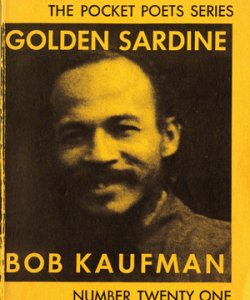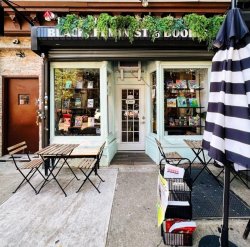Sharing Poetry Chapbooks Online

Poets House in New York City launches an interactive digital exhibition of their chapbook collection.
Jump to navigation Skip to content

Poets House in New York City launches an interactive digital exhibition of their chapbook collection.

Poet and memoirist Meghan O’Rourke, the incoming editor of the Yale Review, discusses her approach to editing, her plans for the journal, and the trends she’s most excited about.

The first lines of a dozen noteworthy books, including The Tradition by Jericho Brown and Orange World by Karen Russell.
Source Booksellers is an independent bookstore in Detroit’s Midtown district that specializes in nonfiction books. They also host literary readings, book talks, and conversations with local and national authors; mind, body, and spirit classes and workshops; and other community events.

Pages Bookshop carries a highly curated selection of literary fiction, nonfiction, and children’s literature. The store also features a children’s area and a section dedicated to past and present-day Detroit, and hosts frequent literary events.

“I remember what it did to me. I got up and I began to wave my hands above my head, alone in the dark,” writes Moeko Fujii in the New Yorker about watching the final scene of Claire Denis’s 1999 movie Beau Travail, in which the protagonist bursts into dance while alone at a nightclub—a captivating glimpse of a private exuberance rising momentarily to the surface. Think of a memorable scene from a favorite movie that has a character joyfully engaged in a physical activity—dancing, running, singing, cooking—that has made you feel something resonant, and perhaps inspired you to move your own body. Write a poem about this connection and the impact it had on you.

“If what you’re writing begins to scare you, don’t stop—it’s about to get real good.” —Gala Mukomolova, author of Without Protection
Melville House Bookstore is located behind the Melville House Publishing office in the Dumbo neighborhood of Brooklyn. The bookstore is open Monday to Friday from 10:00 PM to 6:00 PM and has regular (and free) evening events that start at 7:00 PM.

Cafe con Libros is an intersectional feminist bookstore welcoming of all who stand with and on behalf of the full human rights of womxn and girls. Located in the Crown Heights neighborhood of Brooklyn, this bookstore and café hosts a regular reading series and community book clubs.

Submissions are currently open for the Spoon River Poetry Review Editors’ Prize Contest. The annual contest awards $1,000 and publication in the journal to a single poem. The winning poet will also be invited to read at the annual Lucia Getsi Reading Series held in Bloomington, Illinois. Two runners-up will also each receive $100.
Using the online submission system, submit up to three previously unpublished poems totaling no more than 10 pages with a $20 entry fee, which includes a yearlong subscription to the review. The deadline is April 15. All entries will be considered for publication. Visit the website for complete guidelines.
The judge, who will write an introduction to the winning poem, will be announced after the winner is selected. Recent judges include G. C. Waldrep, Rachel Zucker, Joshua Corey, Juliana Spahr, David Baker, and C. S. Giscombe. Last year, Li-Young Lee selected Mark Svenvold’s poem “Immigration Algorithm (Application Form D (3) b (1) a)” as the winning entry.
Founded in 1976, Spoon River Poetry Review is housed at Illinois State University and celebrates “a poetics of emplacement: writing that reveals the borders of our comfort zones as sites of connection rather than irreconcilable difference.” Kirstin Hotelling Zona has been editor since 2010.